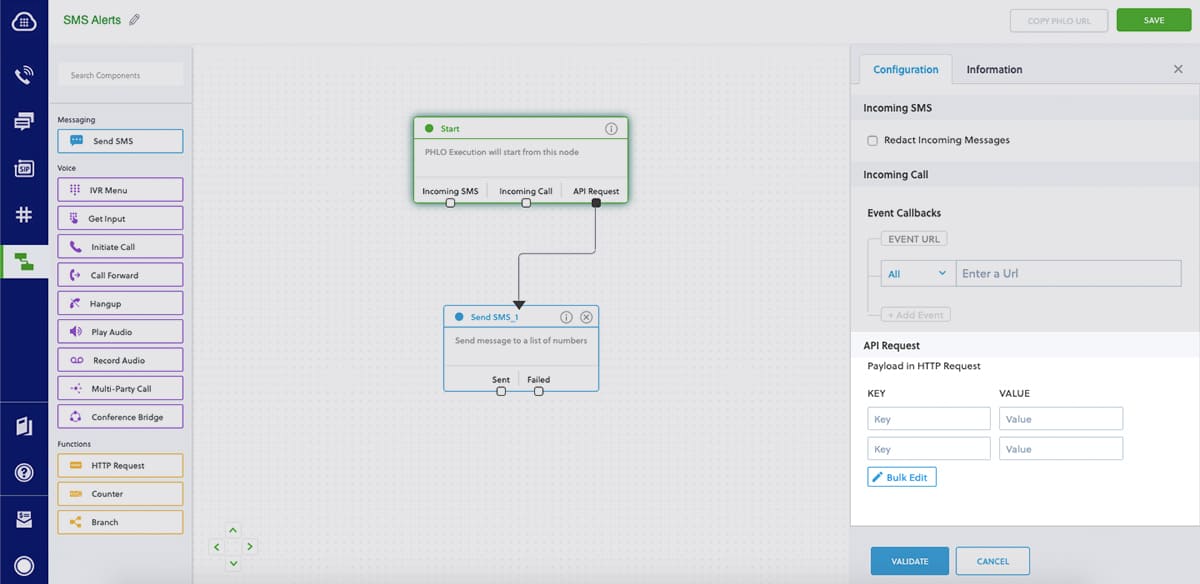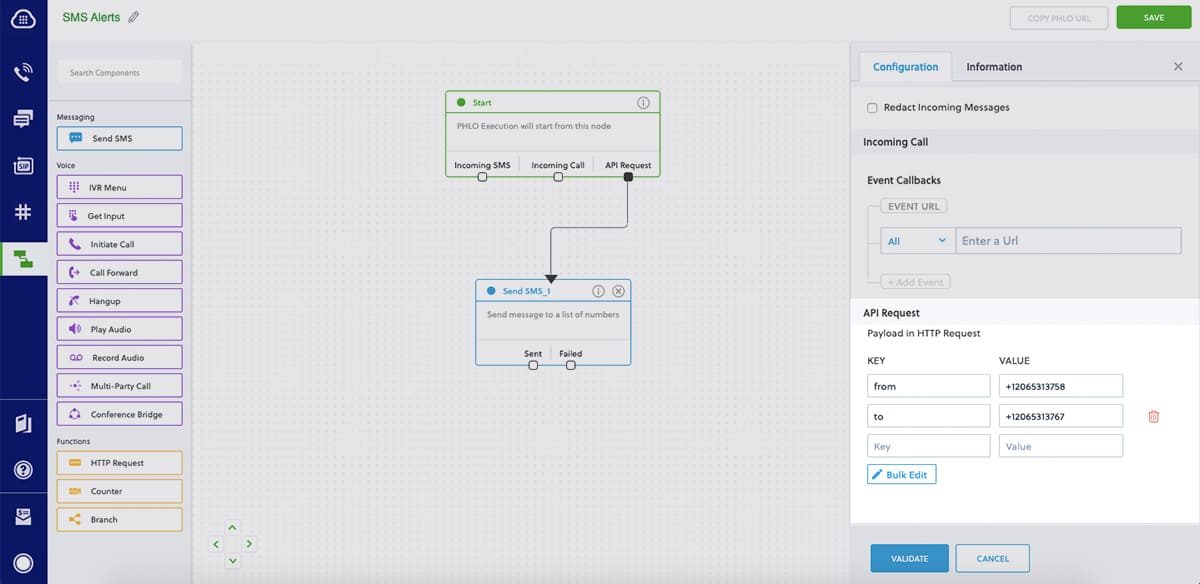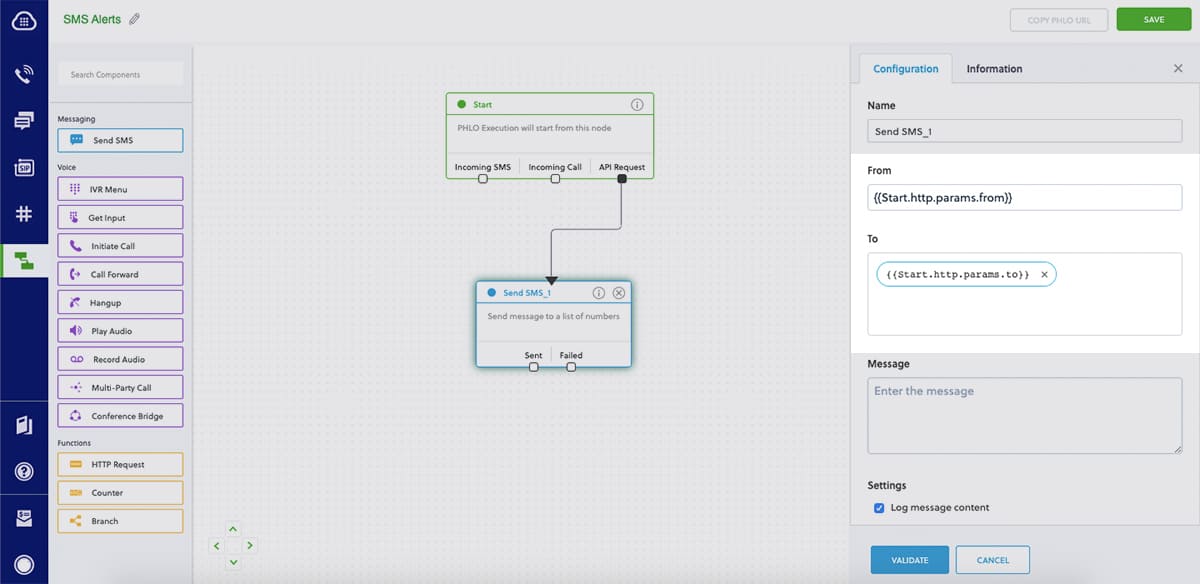Run a PHLO
Run a PHLO by triggering it via an API request to the PHLO URL. PHLO URLs are listed on the PHLO page of the console.
API Endpoint
POST
https://phlorunner.plivo.com/v1/account/{auth_id}/phlo/{phlo_id}
Arguments
URL Params
| Param | Description/Allowed Values |
| auth_idRequiredstring | You can find your Plivo Auth ID on the overview page of the console. |
| phlo_idRequiredstring | Unique identifier for the PHLO. You can find a PHLO ID on the PHLO page of the console. |
Payload
If a dynamic payload is not defined in the Start node of the PHLO (as shown in the screenshot) then no arguments need to be passed. In this example, the payload will be defined in the Send SMS node.

If a dynamic payload is defined in the Start node of the PHLO (as shown in the next screenshot) then values for keys defined in the Start node of PHLO will be passed. In this example, the values are
| Param | Description |
| from | Value of the from key |
| to | Value of the to key |

Payload defined in the Start node will be accessed in the Send SMS node using liquid tags like the one shown in the image below.

Returns
Returns an api_id to uniquely identify the PHLO run, referred to as phlo_run_id. The message attribute in the response provides more information about the PHLO run.
Response
HTTP Status Code: 201
{
"phlo_id": "4c1a9f23-7f56-4879-bb80-db856e1e7701",
"api_id": "7b6f8256-07c7-4d9a-bf2a-a2cd0f05d269",
"message": "b'Send SMS' - b'Send SMS_1' with phlo_run_uuid: 7b6f8256-07c7-4d9a-bf2a-a2cd0f05d269 executed with response: {'api_id': '81525812-3c04-11e9-aa1e-06c75f1208d2',\n 'message': 'message(s) queued',\n 'message_uuid': ['8152b05a-3c04-11e9-aa1e-06c75f1208d2']}"
}
message will differ depending on the node defined for the PHLO trigger
Example Request
1
2
3
4
5
6
7
8
9
10
11
12
13
14
15
16
17
18
19
20
21
22
23
24
# without payload in request
import plivo
auth_id = '<auth_id>'
auth_token = '<auth_token>'
phlo_id = '<phlo_id>'
phlo_client = plivo.phlo.RestClient(auth_id=auth_id, auth_token=auth_token)
phlo = phlo_client.phlo.get(phlo_id)
response = phlo.run()
print str(response)
# with payload in request
import plivo
auth_id = '<auth_id>'
auth_token = '<auth_token>'
phlo_id = '<phlo_id>'
payload = {"from" : "+12025550000","to" : "+12025551111"}
phlo_client = plivo.phlo.RestClient(auth_id=auth_id, auth_token=auth_token)
phlo = phlo_client.phlo.get(phlo_id)
response = phlo.run(**payload)
print str(response)
1
2
3
4
5
6
7
8
9
10
11
12
13
14
15
16
17
18
19
20
21
22
23
24
25
26
27
28
29
30
31
32
33
34
35
36
37
require 'rubygems'
require 'plivo'
include Plivo
AUTH_ID = '<auth_id>'
AUTH_TOKEN = '<auth_token>'
client = Phlo.new(AUTH_ID, AUTH_TOKEN)
# if credentials are stored in the PLIVO_AUTH_ID and the PLIVO_AUTH_TOKEN environment variables
# then initialize client as:
# client = Phlo.new
# without payload in request
begin
phlo = client.phlo.get('<phlo_id>')
response = phlo.run()
puts response
rescue PlivoRESTError => e
puts 'Exception: ' + e.message
end
# with payload in request
begin
phlo = client.phlo.get('phlo_id')
#parameters set in PHLO - params
params = {
from: '12025550000',
to: '12025551111'
}
response = phlo.run(params)
puts response
rescue PlivoRESTError => e
puts 'Exception: ' + e.message
end
1
2
3
4
5
6
7
8
9
10
11
12
13
14
15
16
17
18
19
20
21
22
23
24
25
26
27
28
29
var plivo = require('plivo');
var PhloClient = plivo.PhloClient;
var authId = '<auth_id>';
var authToken = '<auth_token>';
var phloId = 'PHLO_ID';
var phloClient = phlo = null;
// without payload in request
phloClient = new PhloClient(authId, authToken);
phloClient.phlo(phloId).run().then(function (result) {
console.log('Phlo run result', result);
}).catch(function (err) {
console.error('Phlo run failed', err);
});
// with payload in request
var payload = {
from: '12025550000',
to: '12025551111'
}
phloClient = new PhloClient(authId, authToken);
phloClient.phlo(phloId).run(payload).then(function (result) {
console.log('Phlo run result', result);
}).catch(function (err) {
console.error('Phlo run failed', err);
});
1
2
3
4
5
6
7
8
9
10
11
12
13
14
15
16
17
18
19
20
21
22
23
24
25
26
27
28
<?php
/**
* Example for API Request
*/
require 'vendor/autoload.php';
use Plivo\Resources\PHLO\PhloRestClient;
use Plivo\Exceptions\PlivoRestException;
$client = new PhloRestClient("<auth_id>", "<auth_token>");
// without payload in request
$phlo = $client->phlo->get("<phlo_id>");
try {
$response = $phlo->run();
print_r($response);
} catch (PlivoRestException $ex) {
print_r($ex);
}
// with payload in request
$phlo = $client->phlo->get("<phlo_id>");
try {
$response = $phlo->run(["field1" => "value1", "field2" => "value2"]); // These are the fields entered in the PHLO console
print_r($response);
} catch (PlivoRestException $ex) {
print_r($ex);
}
1
2
3
4
5
6
7
8
9
10
11
12
13
14
15
16
17
18
19
20
21
22
23
24
25
26
27
28
29
30
31
32
33
34
35
36
37
38
39
40
import com.plivo.api.Plivo;
import com.plivo.api.PlivoClient;
import com.plivo.api.exceptions.PlivoRestException;
import com.plivo.api.models.phlo.Phlo;
import java.io.IOException;
// without payload
public class Example
{
private static final String authId = "<auth_id>";
private static final String authToken = "<auth_token>";
private static PlivoClient client = new PlivoClient(authId, authToken);
public static void main(String[] args) throws IOException, PlivoRestException
{
String phloId = "<phlo_id>";
Plivo.init(authId, authToken);
Phlo phlo = Phlo.getter(phloId).client(client).get();
PhloUpdateResponse response = Phlo.updater(phloId).payload().run();
}
}
// with payload
public class Example
{
private static final String authId = "<auth_id>";
private static final String authToken = "<auth_token>";
private static PlivoClient client = new PlivoClient(authId, authToken);
public static void main(String[] args) throws IOException, PlivoRestException
{
String phloId = "<phlo_id>";
Plivo.init(authId, authToken);
Phlo phlo = Phlo.getter(phloId).client(client).get();
Map<String, Object> payload = new HashMap<>();
payload.put("phone", "+12025550000");
payload.put("to", "+12025551111");
PhloUpdateResponse response = Phlo.updater(phloId).payload(payload).run();
}
}
1
2
3
4
5
6
7
8
9
10
11
12
13
14
15
16
17
18
19
20
21
22
23
24
25
26
27
28
29
30
31
32
33
34
35
36
37
38
39
40
using System;
using Plivo;
// without payload
namespace test_PHLO_dotnet
{
class Program
{
public static void Main(string[] args)
{
var phloClient = new PhloApi("<auth_id>", "<auth_token>");
var phloID = "<phlo_id>";
var phlo = phloClient.Phlo.Get(phloID);
Console.WriteLine(phlo.Run());
}
}
}
// with payload
namespace test_PHLO_dotnet
{
class Program
{
public static void Main(string[] args)
{
var phloClient = new PhloApi("<auth_id>", "<auth_token>");
var phloID = "<phlo_id>";
var phlo = phloClient.Phlo.Get(phloID);
var data = new Dictionary<string, object>
{
{ "from", "12025550000" },
{ "to", "12025551111" }
};
Console.WriteLine(phlo.Run(data));
}
}
}
1
2
3
4
5
curl --request POST \
--user AUTH_ID:AUTH_TOKEN \
--url 'https://phlorunner.plivo.com/v1/account/{auth_id}/phlo/{phlo_id}' \
--header 'Content-Type: application/json' \
--data '{"from": "12025550000","to": "12025551111"}'
1
2
3
4
5
6
7
8
9
10
11
12
13
14
15
16
17
18
19
20
21
22
23
24
25
26
27
28
29
30
31
32
33
34
35
36
37
38
39
40
41
42
43
44
45
46
47
48
49
50
51
52
53
54
55
56
57
58
59
60
61
62
63
64
65
66
67
68
package main
import (
"fmt"
"plivo-go"
)
// Initialize the following params with corresponding values to trigger resources
const authId = "<auth_id>"
const authToken = "<auth_token>"
const phloId = "<phlo_id>"
// without payload in request
func main() {
testPhloRunWithoutParams()
}
func testPhloRunWithoutParams() {
phloClient, err := plivo.NewPhloClient(authId, authToken, &plivo.ClientOptions{})
if err != nil {
fmt.Print("Error", err.Error())
return
}
phloGet, err := phloClient.Phlos.Get(phloId)
if err != nil {
fmt.Print("Error", err.Error())
return
}
response, err := phloGet.Run(nil)
if err != nil {
fmt.Print("Error", err.Error())
return
}
fmt.Printf("Response: %#v\n", response)
}
// with payload in request
func main() {
testPhloRunWithParams()
}
func testPhloRunWithParams() {
phloClient, err := plivo.NewPhloClient(authId, authToken, &plivo.ClientOptions{})
if err != nil {
fmt.Print("Error", err.Error())
return
}
phloGet, err := phloClient.Phlos.Get(phloId)
if err != nil {
fmt.Print("Error", err.Error())
return
}
//pass corresponding from and to values
type params map[string]interface{}
response, err := phloGet.Run(params{
"from": "12025550000",
"to": "12025551111",
})
if err != nil {
println(err)
}
fmt.Printf("Response: %#v\n", response)
}
